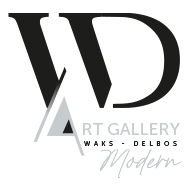Artist : Jean Claude Chastaing (1946-2014)
Title : Interior Portrait, 2007
Medium : Collage, painting and scratching on paper
Type of work : Original diverse art signed lower right by the artist
Dimensions : 28 x 21 cm (40 x 29 cm with margins)
Condition : Good
Provenance : Certified original of the artist. The receipt is the Authenticity Certificate and is the Gallery’s Guarantee.
Why Bertrand Likes : As a lover of nature I particularly like the walks in the forest that Jean-Claude Chastaing offers us with his juxtaposed colors representing the leaves that we see moving with the wind. The artist suppresses the real in his works and lets us see the invisible or the intimate. I also like his provocative side which criticises conformism as in "the housewife" or "working girl".
Why Nathan likes : I love the detective part of our work- discovering unjustly forgotten or unknown artists, and then bringing them to you at an affordable price. There is no better example than Jean-Claude Chastaing. Photography has always been a hobby of mine, and I am old enough to have had a darkroom in the 1970s where I would work, late at night after performing at the Sydney Opera House! So to find someone, just a few years older than me, who took photography somewhere else, and somewhere so beautiful is magical. I’m going to keep some of these mini masterpieces hanging on my walls. I can’t say which of his works I prefer, but there is probably something for everyone. He was obviously a tortured perfectionist, always seeking new and better ways to express what must have been a very wide range of personal emotions and (probably often inner) experiences.
Expert's comments and artist's biography : Jean-Claude Chastaing had an atypical career marked by a difficult childhood. His nonconformism pushes him artistically towards the surrealists. Also a poet, he tries with his works and in particular with photography to achieve an unexpected form of poetry. Like the surrealists, Jean-Claude Chastaing refuses to perceive life and death in a contradictory way, the real and the imaginary, the past and the future, the communicable and the incommunicable. He photographs reality but through his various additions (painting, collage, etc.) he introduces a dose of dream, imagination revealing an underlying life into his works. Women are idolized and inspiring and sex is sometimes sacred. His often strange characters let us perceive the imperceptible as the unconscious. Nature, another important subject and the elements that compose it, become the privileged accessory of the dream and he offers us a new conception of the world. In this nature the forest is populated by a fauna and a flora at the same time real and fantastic. The city and in particular Paris, the city par excellence for the artist, is dehumanized, it becomes an escapist’s haven, where one can hide or get lost. Some photos with their lampposts at night refer to René Magritte's works. The artist is unpredictable, he uses provocation and humor in order to criticize moral order, conformism or accepted ideas. The works offered and selected by our gallery fall into 3 categories:
1- Photomontages: Influenced by the collages of Max Ernst (he pays homage to him in one of his works), he builds an unusual planet with his photomontages, photography paradoxically becomes the instrument he favors to question the real. His photomontages and mixed techniques works are always in the style of Max Ernst. He cuts and glues photos, sometimes adds color collages and for some photomontages, retouches with paint. He sometimes also rubs the developed collage/ photographs which gives an unexpected and strange smooth appearance which follows surrealist doctrine. He will often use this technique with portraits of men, women and children, giving them both a human and a ghost side.
2- Photo paintings: The artist is also particularly fond of photo painting, the latter mainly in black and white then replaces the canvas on which he paints with expressive saturated colors, sometimes even almost phosphorescent. Vincent Van Gogh's influence is obvious, he pays tribute to him in one of his collages.
3- Photographs: Surrealist also in pure photography, the artist uses the close-up which gives his works and in particular his flowers, puddles ... a supernatural character. His photographs, which could be described as abstract, are worked during the darkroom printing. Jean-Claude Chastaing uses chance, he manipulates, burns, and also becomes spectator in the creation of his own work. The result is reminiscent of the experience told by Man Ray who accidentally developed a blank sheet of paper "before my eyes an image was taking shape ...".
Biography: Jean Claude Chastaing was born in 1946 to a washerwoman mother and a working father. In 1968, he decides to enter the seminary but does not tolerate submission. He then militated in politics while starting to write poems. Cheval d´attaque, a Franco-Walloon poetry review published in Paris by Didier Paschal-Lejeune devotes an entire 36-page issue to him on June 4, 1972. At the same time, he began drawing and painting. In the 80s, he discovered what would become his passion and his favorite medium: photography. The artist will exhibit his art photos at the Baudoin square. Altruistic, discreet and simple man the artist does not wish to promote his work despite an undeniable talent.
This description was developed by us following our expertise and the various reference books on the artist in our possession, any copying is therefore prohibited.



